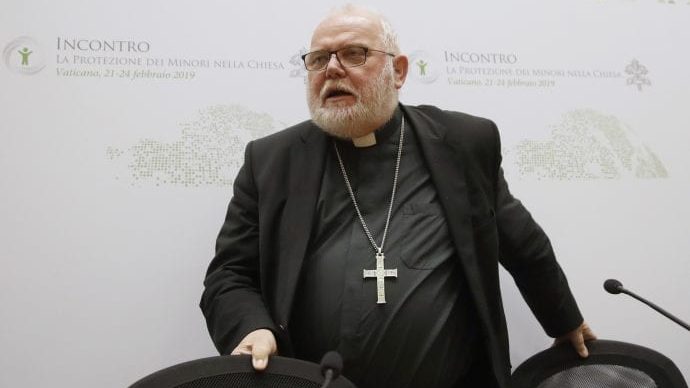On Tuesday, German Cardinal Reinhard Marx announced that he will not seek a second term as head of the national bishops’ conference, citing age and a desire to spend more time in his archdiocese as key reasons for the decision.
Marx, who was tapped as the archbishop of Munich and Freising in 2008, was elected president of the German episcopal conference in 2014. In a Feb. 11 communique posted to the website for the German episcopal conference, he said during the conference’s March 2-5 general assembly he is “not available” to be elected for a second term.
“It has been clear for some time,” he said, noting that he would be 72 by the time his second term ended, just three years before the age of 75, when bishops and cardinals are required to submit their resignations to the pope.
“I think it should be the turn of the younger generation,” he said, adding that he believes more frequent switch-ups in the position could be a positive thing for the bishops’ conference.
Marx said he would continue to be active in the conference, as well as participating in the two year “synodal way” the German bishops are currently undergoing.
Since Pope Francis took office in 2013, Marx has been a key player in his pontificate. Shortly after his election, Francis tapped Marx as a member of his top advisory council, which features prelates from different regions around the world.
He has also proven to be a consistent provocateur, taking a leading role in the Vatican’s financial reform as president of the Council for the Economy, pushing for a more progressive interpretation of Francis’s 2016 exhortation on the family, Amoris Laetitia, advocating for intercommunion in mixed Catholic-Protestant marriages, and also calling for greater openness to LGBT relationships.
In February 2018, Marx announced plans for the German bishops’ conference to publish a pastoral handout detailing the specifics of when Protestant spouses of Catholics “in individual cases” and “under certain conditions” could receive Communion, provided they believe the Catholic Church’s teaching on the Eucharist.
Though a draft version of Marx’s handout was adopted by some two-thirds of German bishops, many objected and appealed to the Vatican to intervene. The Vatican eventually organized a meeting to discuss the issue and ultimately returned the issue back to the German bishops for further discussion, asking them to reach a solution everyone could be happy with.
Most recently, Marx caused controversy with the March 2019 announcement of a “binding synodal process” undertaken as a reaction to German Catholicism’s rapidly diminishing numbers through what Marx said are the three key issues arising largely from the clerical abuse crisis: Priestly celibacy, the Church’s teaching on sexual morality, and a reduction of clerical power.
In his homily on New Year’s Eve 2018, Marx said the Church may need to modify its traditions in order to respond adequately to the abuse crisis, since, in his view, current preventative measures are not enough.
“The hour has come to deeply commit ourselves to open the way of the Church to renewal and reform,” he said, adding that he expected 2019 to be a year of “unrest and opposition” in the German Church, but that “new thinking is required.”
Critics have countered that the so-called “synodal way” would lead to a relaxing of the Catholic Church’s position on priestly celibacy and homosexuality, and Marx has met opposition from some German bishops, including Cardinal Rainer Maria Woelki of Cologne.
In June 2019, three months after Marx announced the “synodal way,” Francis weighed in through a letter to the German bishops reminding them they don’t walk alone, but with the universal Church. The pontiff also reminded them that a “structural” reform, simply changing to adapt to modern times, is not the solution.
In a separate Sept. 4 letter, Canadian Cardinal Marc Ouellet, head of the Vatican’s Congregation for Bishops, cautioned the German bishops that their consultations must adhere to the canonical procedures for a plenary council.
Ouellet reminded the bishops that in proposing a process that would include “binding deliberations” on new rules for the Church in Germany, they were, in effect, planning a “plenary council,” which would require prior approval by Francis before any changes could formally be made.
In his statement, Marx said he is happy with the way the German synodal process is going, saying it has had a “good start,” and he plans to stay involved even after his term as president of the bishops’ conference comes to an end.

